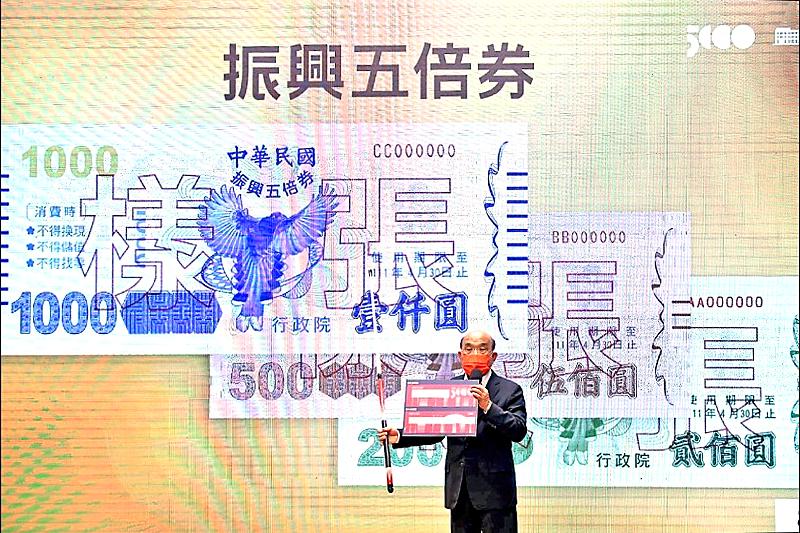More than 155,000 foreign nationals, mainly Alien Permanent Resident Certificate (APRC) holders and foreign spouses of Taiwanese citizens, would be eligible to obtain the government’s Quintuple Stimulus Vouchers next month, the National Immigration Agency (NIA) said yesterday.
About 140,000 foreign spouses and 16,000 APRC holders in Taiwan are eligible to claim the NT$5,000 of vouchers that are to be issued to stimulate the economy amid the COVID-19 pandemic, the agency said.
Foreign diplomats based in Taiwan are also eligible to receive the vouchers, which are to be issued starting on Oct. 8 and would be valid until April 30 next year, the agency said.

Photo: Wu Chih-lun, Taipei Times
Registration to obtain the digital version of the vouchers would open tomorrow for Taiwanese citizens of all ages and eligible foreign nationals, it said.
The vouchers would also be available as printed coupons and can be preordered on the Web site https://5000.gov.tw or at kiosks at major convenience stores, using the applicant’s National Health Insurance (NHI) card, starting on Sunday, the agency said.
Eligible foreigners who have not yet obtained an NHI card can take their residency certificate to a post office to collect a printed version of the vouchers, starting on Oct. 8, it said.
Foreign spouses, including those from China, whose residency documents are based on investment or employment, can call an NIA service station for help if they encounter any difficulty obtaining their vouchers, it said.
Once informed, the NIA would register them in the system as spouses of Taiwanese citizens so they can claim their vouchers, it added.
Questions about the stimulus voucher program can be directed to the agency through its hotline at 0800-024-111, which provides service in seven languages — Cambodian, Chinese, English, Indonesian, Japanese, Thai and Vietnamese — the agency said.
For Chinese-language services, two other hotlines are also available at 1988 and 1996, it said.

MORE VISITORS: The Tourism Administration said that it is seeing positive prospects in its efforts to expand the tourism market in North America and Europe Taiwan has been ranked as the cheapest place in the world to travel to this year, based on a list recommended by NerdWallet. The San Francisco-based personal finance company said that Taiwan topped the list of 16 nations it chose for budget travelers because US tourists do not need visas and travelers can easily have a good meal for less than US$10. A bus ride in Taipei costs just under US$0.50, while subway rides start at US$0.60, the firm said, adding that public transportation in Taiwan is easy to navigate. The firm also called Taiwan a “food lover’s paradise,” citing inexpensive breakfast stalls

TRADE: A mandatory declaration of origin for manufactured goods bound for the US is to take effect on May 7 to block China from exploiting Taiwan’s trade channels All products manufactured in Taiwan and exported to the US must include a signed declaration of origin starting on May 7, the Bureau of Foreign Trade announced yesterday. US President Donald Trump on April 2 imposed a 32 percent tariff on imports from Taiwan, but one week later announced a 90-day pause on its implementation. However, a universal 10 percent tariff was immediately applied to most imports from around the world. On April 12, the Trump administration further exempted computers, smartphones and semiconductors from the new tariffs. In response, President William Lai’s (賴清德) administration has introduced a series of countermeasures to support affected

CROSS-STRAIT: The vast majority of Taiwanese support maintaining the ‘status quo,’ while concern is rising about Beijing’s influence operations More than eight out of 10 Taiwanese reject Beijing’s “one country, two systems” framework for cross-strait relations, according to a survey released by the Mainland Affairs Council (MAC) on Thursday. The MAC’s latest quarterly survey found that 84.4 percent of respondents opposed Beijing’s “one country, two systems” formula for handling cross-strait relations — a figure consistent with past polling. Over the past three years, opposition to the framework has remained high, ranging from a low of 83.6 percent in April 2023 to a peak of 89.6 percent in April last year. In the most recent poll, 82.5 percent also rejected China’s

PLUGGING HOLES: The amendments would bring the legislation in line with systems found in other countries such as Japan and the US, Legislator Chen Kuan-ting said Democratic Progressive Party (DPP) Legislator Chen Kuan-ting (陳冠廷) has proposed amending national security legislation amid a spate of espionage cases. Potential gaps in security vetting procedures for personnel with access to sensitive information prompted him to propose the amendments, which would introduce changes to Article 14 of the Classified National Security Information Protection Act (國家機密保護法), Chen said yesterday. The proposal, which aims to enhance interagency vetting procedures and reduce the risk of classified information leaks, would establish a comprehensive security clearance system in Taiwan, he said. The amendment would require character and loyalty checks for civil servants and intelligence personnel prior to